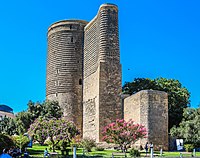
Photo from wikipedia
Purpose This study aims to examine the antecedents of halal brand equity on destination brand equity (DBE) within the tourism sector. Although much has been done on halal tourism, the… Click to show full abstract
Purpose This study aims to examine the antecedents of halal brand equity on destination brand equity (DBE) within the tourism sector. Although much has been done on halal tourism, the issue of halal and brand equity has received little attention in a non-Islamic state context. Design/methodology/approach Using the brand equity theory, 312 Muslim tourists were conveniently drawn from the Larabanga tourism site with the use of structural equation modelling technique to analyse the data. Findings The study revealed that halal brand awareness and halal value have positive and significant impact on DBE. Also, halal perceived brand quality and halal image had a negative but significant impact on DBE. Research limitations/implications This research is on a country-specific halal brand equity tourism destination, which means that the findings cannot be generalized to other geographical areas. Practical implications The study provides an insight into halal tourism and destination equity, which is important for marketers, the ministry of tourism and local tourism officials to support halal tourism in a non-Islamic country. Originality/value This paper fills a gap by presenting the first comprehensive overview of halal brand equity research that enhances ongoing discussions in the hospitality and tourism field in a non-Islamic context and proposes priorities for future research.
Journal Title: Journal of Islamic Marketing
Year Published: 2021
Link to full text (if available)
Share on Social Media: Sign Up to like & get
recommendations!